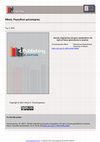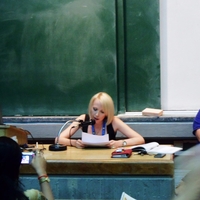Papers by Maria K . Chorianopoulou

My doctoral dissertation is in the field of Applied Ethics, and in particular in the domain of Bi... more My doctoral dissertation is in the field of Applied Ethics, and in particular in the domain of Bioethics, which is unquestionably by far the most up-to-the-minute philosophical branch. Nonetheless, I am confident that to address in detail major bioethical dilemmas, my first task would consist in briefly examining the history of the concept of ‘right’, emphasising on some crucial moments of that history. Thus, I am trying to unravel the major stoic contribution to the establishment of human rights, to mention the severe differences between two important and opposed traditions (to wit natural law and legal positivism), as well as to describe the tight connection between human rights and human dignity, since dignity is presented as the justificatory basis for human rights. After that, in the second chapter I shed light on the widely discussed ‘right to self-ownership’, which if related to bioethical issues, such as abortion and the ethics of paid organ transplantation, may lead to mora...

Οι τίτλοι που περιλαμβάνονται στην σειρά Εγχειρίδια της Έδρας Βιοηθικής της UNESCO μεταφράζονται ... more Οι τίτλοι που περιλαμβάνονται στην σειρά Εγχειρίδια της Έδρας Βιοηθικής της UNESCO μεταφράζονται με έγγραφη άδεια του Κτήτορα της Έδρας Καθηγητή Amnon Carmi προς το Ελληνικό Κλιμάκιο της Διεθνούς Έδρας Βιοηθικής, το οποίο έχει ιδρυθεί και λειτουργεί στο Εθνικό και Καποδιστριακό Πανεπιστήμιο Αθηνών, και προς το Εργαστήριο Εφαρμοσμένης Φιλοσοφίας του Τμήματος Φιλοσοφίας του Εθνικού και Καποδιστριακού Πανεπιστημίου Αθηνών. Οι πρωτότυποι τίτλοι αποτελούν πνευματική ιδιοκτησία των συγγραφέων και της Διεθνούς Έδρας Βιοηθικής, και διατίθενται ελεύθερα από τον ιστότοπο της International Chair in Bioethics (WMA Cooperation Center). Οι μεταφράσεις αποτελούν πνευματική ιδιοκτησία των μεταφραστών, του Ελληνικού Κλιμακίου της Διεθνούς Έδρας Βιοηθικής και του Εργαστηρίου Εφαρμοσμένης Φιλοσοφίας του Τμήματος Φιλοσοφίας του ΕΚΠΑ, και η διάθεσή τους υπόκειται στις προβλέψεις που διέπουν την άδεια χρήσης Creative Commons (CC) BY NC SA.

Ηθική. Περιοδικό φιλοσοφίας, 2021
Genetic engineering is currently at the forefront of biotechnological innovation and aspires to c... more Genetic engineering is currently at the forefront of biotechnological innovation and aspires to change once and for ever the way we understand and handle human nature. Especially the growth of Eugenics makes us visualise a different world, where humanity will not only dispense itself from the detrimental gene mutations that are accountable for fatal illnesses, but will also ameliorate through prenatal gene manipulation. In the first part of this paper, I will introduce the responsibility-oriented morality of Hans Jonas, who supports vividly all efforts of negative Eugenics but seems sceptical about genetic enhancement, since on the one hand we have no right to decide on behalf of our descendants on what is best for them, and on the other due to his view that the abundance of our genetic stock should not hang on parents’ desires. In the second part, I will correlate these oppositions with Hannah Arendt’s concept of “natality”. Not only do Jonas and Habermas invoke it with applause; “...

Στη διδακτορική μου διατριβή επεξεργάζομαι από φιλοσοφική σκοπιά ορισμένα επίκαιρα ζητήματα της ε... more Στη διδακτορική μου διατριβή επεξεργάζομαι από φιλοσοφική σκοπιά ορισμένα επίκαιρα ζητήματα της εφαρμοσμένης ηθικής. Σε πρώτο επίπεδο, καταπιάνομαι με την έννοια των δικαιωμάτων και προβαίνω στις απαραίτητες εννοιολογικές διασαφηνίσεις. Μετά την επιλεκτική ανάδειξη της ιστορικής πορείας της εν λόγω έννοιας, αναφέρομαι στις απαρχές του φιλοσοφικού ενδιαφέροντος για τα δικαιώματα του ανθρώπου και δίνω μεγάλη βαρύτητα στην παράδοση του φυσικού δικαίου, στη διάκρισή του από τον νομικό θετικισμό, καθώς και στη στωική φιλοσοφία, με έμφαση στο αμφισβητούμενο "δικαίωμα στον θάνατο". Επιπλέον, αναδεικνύω την ανθρώπινη αξιοπρέπεια ως δικαιολογητική βάση των δικαιωμάτων και ανατρέχω σε ορισμένες σημαντικές προσεγγίσεις ως προς το νόημά της. Ακολούθως, αφού σχολιάσω το δημοφιλές "δικαίωμα στην αυτοκτησία" και την εφαρμογή του στις μεταμοσχεύσεις και τις αμβλώσεις, αναδεικνύω τις θέσεις του Rawls για τη γενετική μηχανική και (στο τρίτο πλέον κεφάλαιο) την έννοια των "ορι...

Conatus, 2018
The principal objective of this essay is to briefly present and discuss what could be thought of ... more The principal objective of this essay is to briefly present and discuss what could be thought of as Engelhardt's two approaches on animality. The first, rather literal use of the term, refers to non-rational animals stricto sensu, while the second and more important one thematizes humanity's ontological self-degradation resulting from the dominant pleasure-oriented culture of our time. As for the first, aiming to moderate his outright acceptance of animal use, I invoke Dworkin's insights on sanctity, which substantiate a plausible alternative stance. As for the second, I attempt to critically reconstruct the way in which, according to Engelhardt, humanity, having rejected every transcendent inquiry, is increasingly embracing its lower nature. In conclusion, I will hint that this return to animality may be impeded by upcoming challenges that already leave a noticeable imprint on a global scale.

Genetic engineering is currently at the forefront of biotechnological innovation and aspires to c... more Genetic engineering is currently at the forefront of biotechnological innovation and aspires to change once and for ever the way we understand and handle human nature. Especially the growth of Eugenics makes us visualise a different world, where humanity will not only dispense itself from the detrimental gene mutations that are accountable for fatal illnesses, but will also ameliorate through prenatal gene manipulation. In the first part of this paper, I will introduce the responsibility-oriented morality of Hans Jonas, who supports vividly all efforts of negative Eugenics but seems sceptical about genetic enhancement, since on the one hand we have no right to decide on behalf of our descendants on what is best for them, and on the other due to his view that the abundance of our genetic stock should not hang on parents’ desires. In the second part, I will correlate these oppositions with Hannah Arendt’s concept of “natality”. Not only do Jonas and Habermas invoke it with applause; “...











Uploads
Papers by Maria K . Chorianopoulou